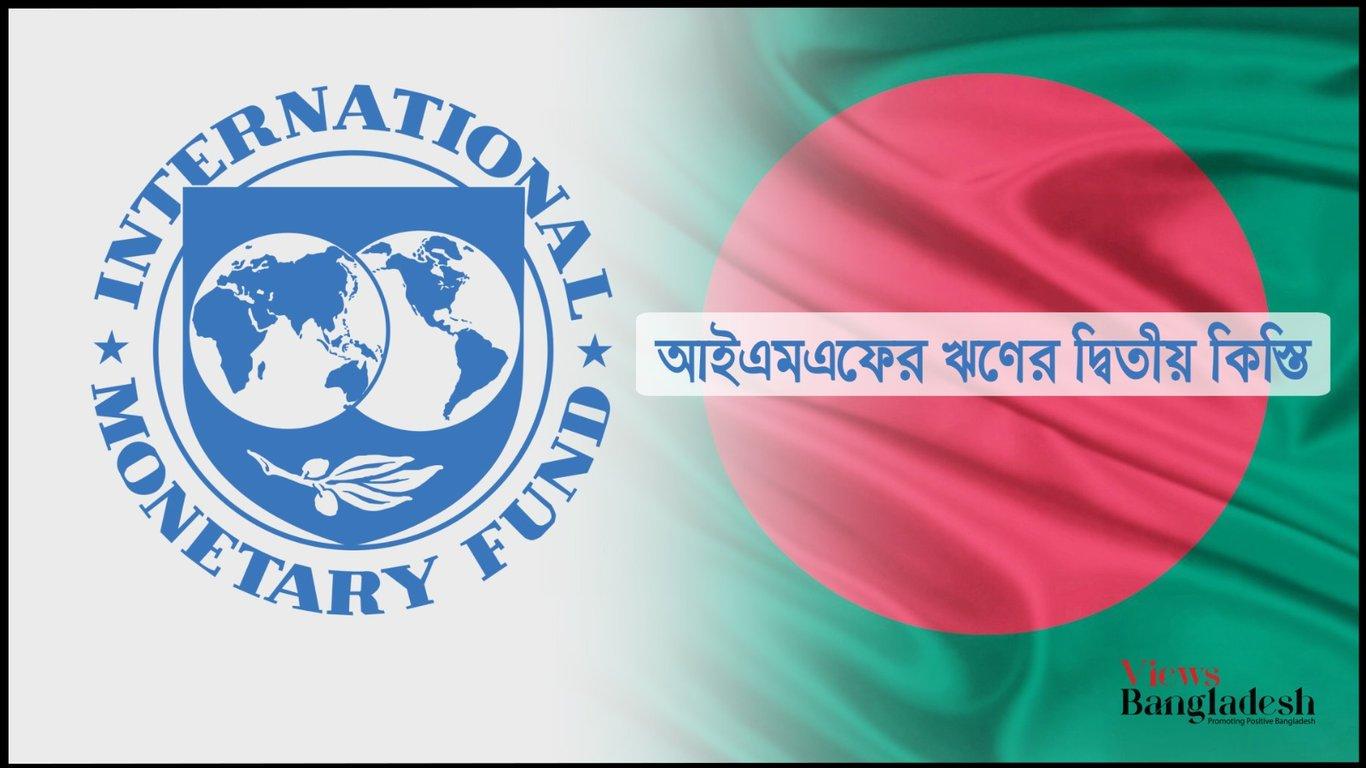Release of IMF loan's second installment and other matters

Let's start with a story. There was a very powerful landlord in a certain region. His words held absolute authority within the area under his control. No one dared to speak against him. The landlord's nature was such that he could not tolerate an educated and prosperous child from a poor family in his domain. One day, a peasant approached the landlord and said, "Sir, my son has been admitted to school." Upon hearing this, the landlord said, "Even if your son manages to get enrolled in school, he will not be able to pass."Once, the peasant's son indeed performed well in fifth grade and secured admission to high school.
When the peasant informed the landlord of this joyous news, the landlord remarked, "Even if he gets admitted to high school, he won't be able to pass the matriculation exam." In time, the boy not only passed the matriculation and intermediate exams but also secured admission to a reputable university, eventually obtaining a master's degree. At one point, the young man landed a good job, and when the landlord learned of this positive development, he said, "Even if your son has a job, he won't receive a salary." However, the young man continued to receive a regular salary from his job. Upon hearing this news, the landlord made no further comments. And that's where the story concludes.
There are some people who cannot appreciate the well-being of others. They behave much like landlords. The story reminds us of the positive mindset of a segment of the Bangladeshi population regarding the loan from the International Monetary Fund (IMF). In July 2022, Bangladesh applied to the International Monetary Fund (IMF) for a loan of 450 crore US dollars. Based on that application, the institution approved a loan of 470 crore US dollars for Bangladesh on January 30. The decision stipulates that the IMF will disburse the funds in seven installments, favourably supporting Bangladesh.
After the loan approval, the first installment of funds is immediately disbursed favorably to Bangladesh. As the initial installment, Bangladesh receives 47 crore and 63 lakh US dollars from the institution. At that time, Finance Minister A.H.M. Mustafa Kamal said, "The IMF has approved the loan exactly as Bangladesh desired." However, his statement did not accurately reflect the situation. Because the IMF imposes 38 conditions on Bangladesh for loan disbursement. Despite agreeing to adhere to all these conditions, Bangladesh has obtained the loan. Bangladesh did not opt for a conditional loan. So it is not at all true that the IMF gave the loan exactly as Bangladesh wanted.
One notable condition imposed by the IMF was to reduce the non-performing loan (NPL) ratio of state-owned banks through comprehensive reforms in banking operations, lowering the default rate from 20 percent to 10 percent. Additionally, the conditions involved increasing revenue income and adhering to international standards in calculating reserves on a net basis in foreign exchange reserves management. Notably, the funds disbursed by the Bangladesh Bank from reserves for various projects and loans granted to the Export Development Fund were also considered as part of the reserves. The IMF's statement clarifies that any funds not under my direct control and not available for immediate use cannot be considered as reserve funds. Bangladesh has accepted these conditions before obtaining approval for the loan.
The government applies for loans from the IMF when the country's economic situation becomes extremely precarious. Reserves are depleting rapidly, and there is a significant downturn in the international trade, leading to a severe economic crisis. At such times, any amount of loan from the IMF becomes an absolute necessity for Bangladesh. Now the question is, in the past decade, Bangladesh did not take any loans from the IMF; however, suddenly, what prompted the necessity for such a loan? Were there no alternatives or mitigating measures without resorting to an IMF loan? The way IMF plans to disburse the loan in seven installments, Bangladesh will have to wait until 2026 to receive the full amount. In this regard, a specific economist and advisor to the Prime Minister, Dr. Mashiur Rahman's statement might be recalled.
He once mentioned in a programme that the IMF loan is like a character certificate. In other words, if the IMF approves a loan for a country, then other international organizations do not hesitate to support that country in terms of loans. Therefore, the IMF loan is not just a loan; it also serves as a symbol of credibility for other institutions. After the approval of the USD 4.7 billion loan from the IMF, some economists were saying, like the Zamindar mentioned at the beginning, that even if the IMF approves the loan, the second installment of the loan will not be waived in favor of Bangladesh because Bangladesh will not be able to fulfill the conditions given by the IMF.
The most unfortunate part is that some Bangladeshi economists, who once worked at the IMF, have strongly stated that even though Bangladesh received a concession for the first installment of the IMF-approved loan, it will not receive the money for the second installment. They expressed concerns, but Bangladesh has successfully dispelled the doubts by obtaining the waiver for the second installment of the IMF-approved loan. In the meeting of the Executive Board of the International Monetary Fund (IMF) held in Washington, D.C. on Tuesday, the proposal for the second installment exemption of the $470 million loan to Bangladesh was approved. After the approval of the proposal, the funds for the second installment of the loan have been transferred to Bangladesh's account.
The waiver of the second installment of the loan has led to the conclusion of all speculations and conjectures. It is noteworthy that, for some days, a group of economists in Bangladesh has been asserting that due to human rights violations and other issues, especially related to national elections, the IMF might refrain from granting the second installment waiver to Bangladesh. They had been presenting additional reasons as well. It is worth mentioning that the IMF imposes certain conditions when providing loans to different countries. In other words, every loan from the IMF is conditional. They do not provide loans without conditions. If these conditions are not properly adhered to, even if a country is granted a loan, the funds are not waived. The extent to which Bangladesh has complied with the conditions imposed by the IMF was dependent on whether the next installment would be received or not.
Bangladesh has been unable to fulfill many of the conditions for obtaining IMF loans; however, the Bangladeshi government has been diligent in trying to comply with them. As a result, the IMF has been impressed with Bangladesh's sincerity. In October of the past year, a high-level delegation led by Rahul Anand from the IMF's Asia-Pacific Department visited Bangladesh to assess the status of their compliance with the conditions. The delegation observed that in many areas, Bangladesh has not been able to meet the conditions imposed by the IMF. Nevertheless, Bangladesh remains optimistic and committed to addressing these internal matters related to compliance.
The Bangladeshi government has been unable to comply with some notable conditions imposed by the IMF. Among these conditions, it is noteworthy that despite lifting the ceiling on the interest rate for bank loans, the market-based interest rate has not yet been adopted. Although the Banking Companies Act has been amended, the situation remains somewhat unchanged. While there have been modifications, the Banking Companies Act still somewhat reflects the proverb, "same law, same trouble." Although the law stipulated that two members from the same family could be appointed to the Board of Directors of a privately owned bank, the recent amendment allowed the appointment of four directors from the same family. In the revised law, the provision has been further modified to allow the appointment of only three directors from the same family.
To open a defaulted loan account, one had to file a case in the appropriate court after the expiry of at least five years from the classification as a bad loan. After preserving one hundred percent provisions, the loan account could be opened. Now, a defaulted loan account can be opened after the classification as a bad loan, even if three years have elapsed. The provision preservation requirement has been omitted for this purpose. If the amount of the loan is less than 5 lakh taka, there is no need to file a case against the defaulter in the relevant court. A few years ago, an opportunity for restructuring the loan for a total of 10 years, including a grace period of one year, was provided with a 2% cash down payment. Through the means of restructuring, the provision for defaulted loans is artificially reduced without paying the installments for the delinquent loan.
A few days ago, two prominent entrepreneurs in the country, associated with Janata Bank, have successfully restructured loans amounting to 12 thousand crore taka. Currently, there is an attempt to reduce the amount of defaulted loans through various means, avoiding loan installments. A distinguished economist refers to this effort as an "attempt to clean the house while keeping dirt under the carpet."
There was a special condition from the IMF to increase tax-GDP ratio. For this, emphasis was placed on increasing revenue collection; however, there is no apparent progress in achieving the set goals of this endeavor. It seems unlikely that the targeted revenue collection will be achieved.
While discussions about coordinating the price of fuel with the international market have taken place, no concrete steps have been taken. The conditions set by the IMF regarding reserve conservation have not been fully met. For instance, the institution had set a condition for net reserves to be $24.46 billion in June, but at that time, the actual reserves were $24.7 billion. Despite weaknesses in complying with the IMF's conditions, the institution has expressed satisfaction with Bangladesh's economic performance. Hence, there hasn't been any objection to the exemption of $68 million for the second installment of approved loans in favor of Bangladesh. It is expected that in the future, the remaining installments of approved loans in favor of Bangladesh will also be exempted accordingly.
Many are propagating that the Bangladesh government will attempt to increase reserves using the IMF loan. However, this is not entirely accurate. The way the IMF is providing relief on loan installments, it will not contribute to increasing reserves. This is because the spending from Bangladesh Bank's reserves to cover the loan installments to the IMF cannot be replenished in any way. At this moment, to increase reserves, remittance inflow through informal channels needs to be stopped. Many remitters are not bringing back the earned money into the country as intended.
At least 12 billion US dollars is reported to be held abroad, according to a source. Efforts should be made to repatriate this money swiftly to the country. It is crucial to ensure that no one engages in capital flight under the guise of over-invoicing in the name of importing goods. However, it is also important to note that the import control measures should not hinder the importation of raw materials and capital machinery for industries.
Another delegation from the IMF is expected to visit Bangladesh in March to review the conditionalities they have set. All the conditions imposed by the IMF on the Bangladesh government are not necessarily detrimental. Most of these conditions need to be implemented for the benefit of our economy.
Author: Retired General Manager, Bangladesh Development Bank Limited, and Economic Affairs Writer.


Leave A Comment
You need login first to leave a comment